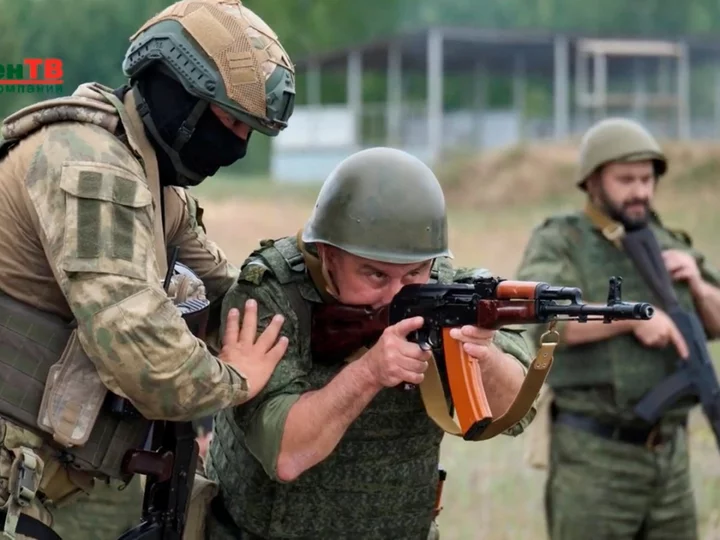
Ukraine Russia war – live: Wagner mercenaries ‘arrive in Belarus’ as Putin sacks top commander
Wagner mercenaries are arriving in Belarus weeks after a failed rebellion against the Kremlin regime, it has been reported. A large convoy of around 60 vehicles, including large trucks and buses, were seen moving northwest to a camp in the village of Tsel, according to military monitoring group ‘Belarusian Gayun’. “A combination of factors indicates that this is a convoy of the Wagner PMCs [private military company], which entered Belarus from the Russian Federation at night in the Krichev area,” it said. Elsewhere, a top Russian commander appears to have been sacked for voicing concerns about the Kremlin’s war strategy in a sign of growing divisions between officers on the front line and the country’s military leadership. The 58th Combined Arms Army’s general-major Ivan Popov was dismissed after a leaked video showed him delivering a blistering attack on the Russian military leadership, whom he accused of “hitting us from the rear, viciously beheading the Army at the most difficult and intense moment”. Britain’s Ministry of Defence said the “comments draw attention to serious disaffection many officers likely harbour towards the senior military leadership.” Read More Wagner boss Yevgeny Prigozhin ‘dead or in prison’ after Putin meeting, former US commander claims Russian general says he has been fired for telling truth about dire situation on Ukraine frontlines What to know about the harrowing Ukraine war doc '20 Days in Mariupol'
2023-07-15 20:55
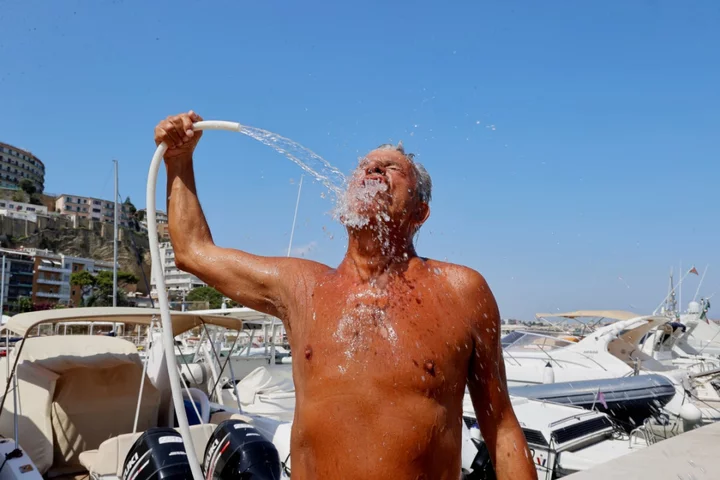
Europe heatwave 2023 – live: Red alerts for 16 cities as blistering 40C heat grips continent
Red alerts for extreme heat have been issued in 16 cities across Italy as the Mediterranean country and swathes of Europe are gripped by blistering hot temperatures. Tourist hotspots Rome, Florence and Bologna are among some of the cities affected, with people there told to take extra care as the mercury climbs towards 40C amid the Cerberus heatwave. Temperatures are set to peak at around 36C (96.8F) in most Italian cities, though Puglia, Sicily, and Sardinia may reach up to 41C. Next week temperatures are predicted to climb as high as 48C in Puglia, Sardinia and Sicily as a second heatwave - named Cheron - hits the country. On Friday Greece introduced emergency measures for workers and zoo animals in Madrid were fed fruit ice-lollies in a bid to cool them do. The Cerberus heatwave is set to get worse over the weekend with the mercury expected to reach as high as 45C in parts of Greece and Spain with temperatures forecast to break all-time records. Read More Land temperatures in Spain surpass 60C as deadly heatwave sweeps Europe UK weather: Met Office issues two yellow warnings as Britons brace for ‘unusual’ winds Europe heatwave: Is it safe to travel to Italy, Spain, Greece and Croatia?
2023-07-15 18:57
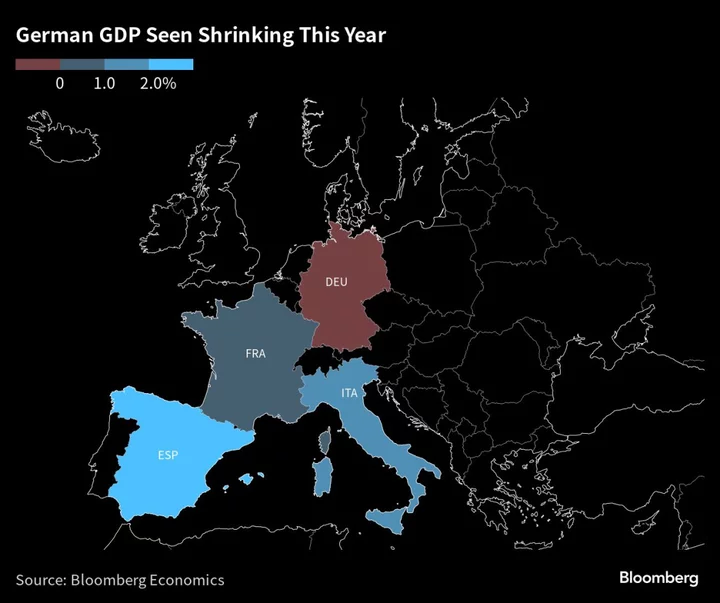
Germans Aren’t Buying Scholz’s Plan to Keep Them Safe and Rich
Chancellor Olaf Scholz is struggling to persuade Germans he can handle the litany of troubles looming over the
2023-07-15 13:46
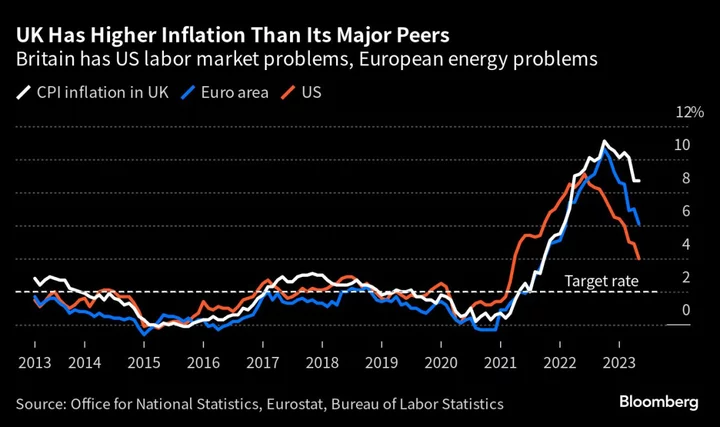
Sunak Officials Play Down Talk of Cooling Prices Before Key Week
After watching British prices surge faster than expected for four straight months, Prime Minister Rishi Sunak’s team isn’t
2023-07-15 13:45
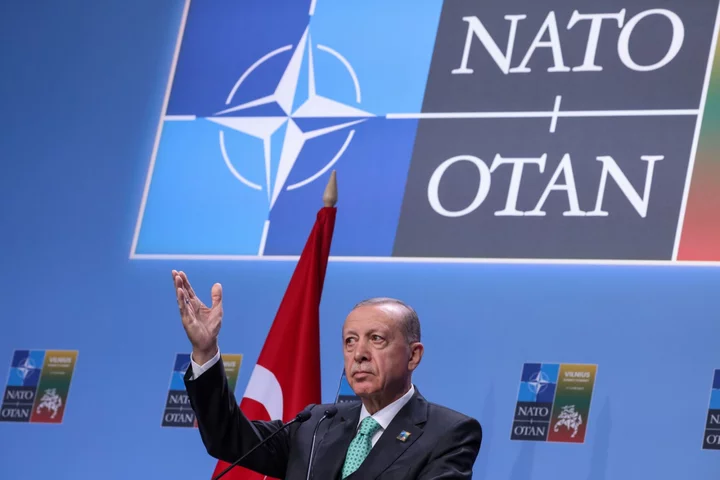
Turkey Parliament Recess No Barrier to Debate Sweden’s NATO Bid
Turkey’s Parliament has enabled its foreign affairs committee to work during its more than two-month summer recess that
2023-07-15 12:57

Putin says Wagner Group has no legal basis and therefore simply doesn’t exist
Russian president Vladimir Putin said that the Wagner private military company “simply doesn't exist” as a legal entity, in comments adding to the series of often bizarre twists that have followed the group’s abortive revolt last month – the most serious threat to Putin’s 23-year rule amid the war in Ukraine. “There is no law on private military organizations. It simply doesn’t exist,” Mr Putin told a Russian newspaper late Thursday, referring to the Wagner group. Mr Putin recounted to Kommersant his own version of a Kremlin event attended by 35 Wagner commanders, including the group's chief, Yevgeny Prigozhin, on June 29. That meeting came just five days after Prigozhin and his troops staged a stunning but short-lived rebellion against Moscow authorities. The meeting was revealed earlier this week by a Kremlin official. Mr Putin said that at the talks, Wagner rejected an offer to keep its troops in Ukraine, where they have played key battlefield roles, under the leadership of their direct commander. “All of them could have gathered in one place and continued to serve,” Mr Putin told the newspaper, “And nothing would have changed for them. They would have been led by the same person who had been their real commander all along.” Mr Putin has previously said that Wagner troops had to choose whether to sign contracts with the Russian Defense Ministry, move to neighboring Belarus or retire from service. According to him, although “many nodded” when he made his proposal, Mr Prigozhin rejected the idea, responding that “the boys won’t agree with such a decision”. This, Mr Putin said, was one of “several employment options” put forward at the meeting. During the revolt that lasted less than 24 hours, Mr Prigozhin’s mercenaries quickly swept through the southern Russian city of Rostov-on-Don and captured the military headquarters there without firing a shot, before driving to within about 200km (125 miles) of Moscow. Mr Prigozhin described the move as a “march of justice” to oust the military leaders, who demanded that Wagner sign contracts with the Defense Ministry by July 1. The fate of Mr Prigozhin and the terms of a deal that ended the armed rebellion by offering amnesty for him and his mercenaries, along with permission, to move to Belarus remain cloudy. Wagner mercenaries are completing the handover of their weapons to the Russian military, the Defense Ministry said Wednesday. Their disarming of Wagner reflects efforts by Russian authorities to defuse the threat they posed and also appears to herald an end to the mercenary group’s operations on the battlefield in Ukraine, where Kyiv’s forces are engaged in a counteroffensive. Read More Russia-Ukraine war – live: Wagner forces training soldiers in Belarus after Prigozhin exile Tucker Carlson and Mike Pence clash in heated exchange over Ukraine at GOP 2024 forum Putin wants to attend an August summit. Host country South Africa doesn't want to have to arrest him Russian antiwar activist allowed into Serbia after spending more than a day at the Belgrade airport Why are Russian and Belarusian players allowed back at Wimbledon? Ukraine war’s heaviest fight rages in east - follow live Charity boss speaks out over ‘traumatic’ encounter with royal aide
2023-07-15 12:15

Turkey's deepening economic crisis prompts Erdogan to look West
Turkey's leader hopes to mend relations and reassure foreign investors who ditched his struggling economy.
2023-07-15 08:52

FTC Loses Appeal Bid to Block Microsoft-Activision Deal
A US appeals court denied a Federal Trade Commission bid to pause Microsoft Corp.’s acquisition of Activision Blizzard
2023-07-15 08:26
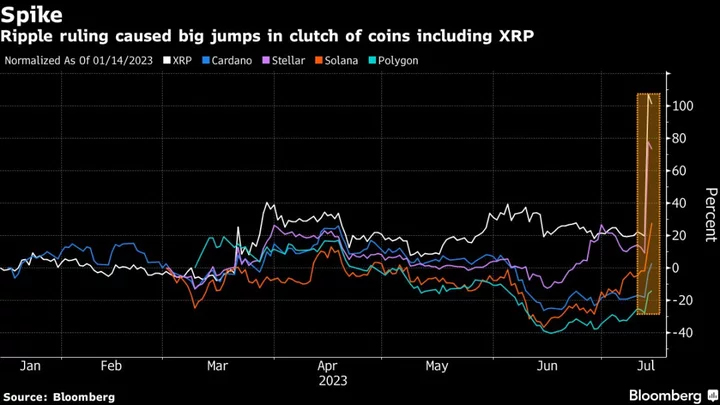
Crypto Market Is Celebrating SEC’s Setback in Ripple Suit. But the Case Is Far From Settled
A US Securities and Exchange Commission lawsuit against Ripple Labs Inc. has kept crypto on edge since 2020
2023-07-15 03:15

Everything we know about missing toddler in French Alps as police abandon search
Police in France are wrapping up the search for a missing toddler after scouring a remote village in the French Alps for five days. Two-year-old Emile was on holiday with his grandparents when he vanished while playing in a garden, sparking a frantic hunt that involved thermic camera drones, helicopters and sniffer dogs. Searches have so far yielded no clues to the whereabouts of the missing boy and police launched a last-ditch bid to find him on Thursday. Here’s a look at everything we know about the case so far. Where did Emile disappear? Emile, whose surname has not been reported, was playing in the garden of a property in Le Vernet - a small village of around 20 houses in the Alpes-de-Haute-Provence on Saturday when he went missing. His family was preparing to go out hiking for the day when they realised the child, who lives near Marseille, had disappeared.The boy’s grandparents had been packing the car when he vanished. Emile is described as 3ft tall, with brown eyes and blonde hair and was wearing a yellow T-shirt, white shorts with a green pattern and walking shoes when he vanished. Reports said he was seen by two people when he left the property but they “lost sight of him”. Police said on Wednesday that at least 10 people were present at the property where Emile was last seen amid a family reunion, with “several uncles and aunts of the child, of all ages, including some minors”, a police source said. How has the search unfolded Authorities in France issued an appeal for information about Emile on 9 July after the boy was reported missing by his grandparents at 5.15pm the previous day. The search operation covered the land and air around Le Vernet and involved hundreds of police officers, soldiers and volunteers, The manager of a local restaurant said staff had looked “everywhere” for the boy as local volunteers helped with the search. “We were preparing for the evening service, when we were told the child had gone missing,” the manager told La Provence. “We all went to see what we could do to help as quickly as possible. “We have looked in places where he could be, we have really looked everywhere for him.” At one point during the search, police helicopters played the voice of Emile’s mother through speakers in the hope that it could help bring him out. On Wednesday evening it was reported that a vehicle with blood on it had been found amid the ongoing search for missing French toddler Emile. In a statement to La Provence, local prosecutor Rémy Avon said analysis had revealed the sample “animal blood”. Emile has now been missing for a week, as investigators admitted they have “no clue” what happened to him. Mr Avon also said that he had taken the decision to call off the “physical” search for Emile on Thursday. Police had been looking at a final plot of land in an area of Vernet, with around 50 officers taking part. “The judicial investigation into the causes of the disappearance will continue,” Mr Avon added. “In particular by analysing the considerable mass of information and elements collected over the past four days.” Police are today combing a 1.8km-long road, that has previously been searched before, in the hope of finding new evidence in Emile’s disappearance. But police say they will be searching the stretch of road more “meticulously” this time. What have politicians said? The mayor of Le Vernet on Friday said the best hope for the missing toddler is that “he’s been kidnapped and is alive”. In an interview with French newspaper Le Figaro, Francois Balique commented on police calling off the physical search for Emile after five days and possible explanation’s for his disappearance. “Our only hope now is that he’s been taken and is alive. It’s the last thing we can hope for and it’s already terrible. “We could consider that someone wanting to cause harm to a child passed by the area, that he saw this beautiful little boy and took him away. He couldn’t survive alone in the wild, that’s for sure.” Mr Balique said it is ”difficult to favour one hypothesis over another” but explained that “the probabilities and the rationality would lead us to believe that we are dealing with an accident”. He continued: “And since little Emile’s body has not been found, it means that he was not alone at the time. We can consider a car accident in which the driver would have panicked and concealed the body. That’s one hypothesis.” Local politician Sylvie Belmontes had earlier said the search reminded her of the case of Yannis Moré, who vanished from Ganagobie, Alpes-de-Haute-Provence in 1989 while playing with friends. “It reminds us of a lot of things. I sent a little message of support to the mayor of Vernet, François Balique”, Ganagobie mayor Sylvie Belmonte told La Provence, referencing the disappearance of 3-year-old Yannis Moré in May 1989. “I was town clerk and I took part in the search to try to find little Yannis”, he added. Mr Avon told a press conference earlier this week that police had “no clue” where the boy was. “His grandparents realised he was no longer there when they went to put him in the car.” What happens next Mr Avon said the previous searches did not yield any clues to solving the mystery of the boy’s disappearance and instead, investigators will be shifting their focus to evaluating evidence already gathered. “The investigation into the causes of his disappearance will continue, notably through analysis of the considerable amount of information and elements gathered over four days,” he added. Read More ‘Best hope’ for toddler missing in French Alps for week is ‘if he’s been kidnapped’ Desperate search for French toddler who vanished on holiday with grandparents Missing French toddler – latest: ‘Only hope is Emile has been taken and is alive,’ Le Vernet mayor says Greece ‘like Africa’ as Europe melts in deadly heatwave forecast to smash record Russian antiwar activist allowed into Serbia after spending more than a day at the Belgrade airport Wagner mercenaries are in Belarus and training the country’s soldiers
2023-07-15 02:17

Greece ‘like Africa’ as Europeans melt in deadly heatwave forecast to smash record
Conditions in Greece have been compared to those in Africa as southern Europeans suffer through a heatwave forecast to only worsen in the coming days. Europe’s highest ever recorded temperature – 48.8C (119.8F) – could be breached in Sicily and Sardinia next week and Spain is expected to reach 45C, experts say. Italy, Spain, France, Germany, Poland and Croatia have all been hit, and officials in several countries have been preparing emergency measures, including mobile phone heat alerts. “It’s like being in Africa,” said 24-year-old tourist Balint Jolan, from Hungary. “It’s not that much hotter than it is currently at home, but yes, it is difficult.” Officials in Athens shut the ancient Acropolis for several hours on Friday to protect visitors as the Greek meteorological service forecast temperatures peaking at 41C in the city. Read live updates on Europe’s heatwave here Hellenic Red Cross workers handed out bottled water to tourists in long queues fanning themselves, and paramedics gave first aid to tourists fainting and suffering dehydration. The mercury on Acropolis Hill is usually even higher due to its altitude and lack of shade, but the last-minute decision left some people frustrated. “I even bought a €50 ticket to skip the line to enter and I couldn’t enter the place,” one said. Elsewhere in Athens, tourists huddled under mist machines. There and in other Greek cities, working hours were changed for the public sector and many businesses to avoid the midday heat, while air-conditioned areas were opened to the public. In the Spanish capital, Madrid, zoo animals were fed fruit ice pops, while authorities in Cyprus urged residents to avoid forest areas where wildfires could be sparked accidentally. Swathes of the Balkans also sweltered. In Croatia, the village of Grebastica near the Adriatic coast was devastated by a wildfire that destroyed cars and homes. Dozens of firefighters and three aircraft struggled to contain the blaze that spread rapidly due to strong southerly winds. The Earth steamed to its hottest June on record, smashing the previous global mark by nearly a quarter of a degree, with global oceans setting temperature records for the third month running, according to the US National Oceanic and Atmospheric Administration – considered the gold standard for record-keeping. Europe’s monster heatwave, called Cerberus, has already claimed at least one life as it brought temperatures surpassing 104F (40C) across the continent this week. On Tuesday, the land surface temperature in parts of Spanish region Extremadura exceeded 140F (60C). A 44-year-old man painting road markings in northern Italy collapsed and died. Many people are worried about next week, when the heat in the country is expected to intensify, and temperatures are forecast to climb to above 45C (113F) in the centre and south, under a new heatwave named Cheron. According to La Repubblica, the heat this weekend could be trumped by 12C in the following days, particularly in Tuscany and Lazio. If so, it would break Europe’s current record of 48.8 Celsius recorded in Sicily in August 2021. The impact of such extremities has been brought into focus by a new study that found up to 61,000 people died in Europe’s sweltering heat last summer. The forecast has also raised fears about the impact on crops and animals. The European Space Agency said: “Italy, Spain, France, Germany and Poland are all facing a major heatwave, with temperatures expected to climb to 48 degrees Celsius on the islands of Sicily and Sardinia – potentially the hottest temperatures ever recorded in Europe.” Emergency services in Turkey have been grappling with both fires and floods, in which three people have died. “While there are heat and fires on one side of the country, there are floods and deluges on the other,” said deputy agriculture minister Veysel Tiryaki. Cornell University climate scientist Natalie Mahowald said: “We are just getting a small taste for the types of impacts that we expect to worsen under climate change.” Climate scientist Friederike Otto of the Imperial College of London said: “Until we stop burning fossil fuels, this will only get worse. Heat records will keep getting broken, people and ecosystems are already in many cases beyond what they are able to deal with.” Additional reporting by agencies Read More Why is there no UK heatwave as Europe swelters during Cerberus? Earth sets its hottest day record for third time in a week Cities in the US are sinking due to the climate crisis
2023-07-15 01:16
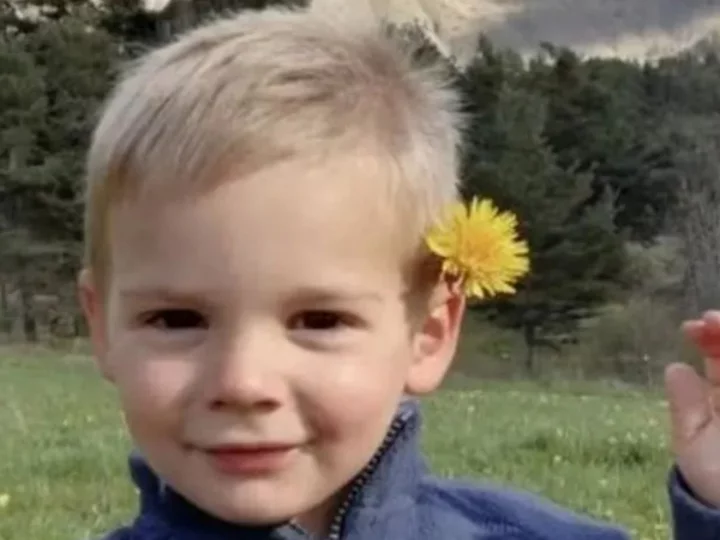
‘Best hope’ for toddler missing in French Alps for week is ‘if he’s been kidnapped’
The best hope for a toddler missing in France is that “he’s been kidnapped and is alive,” the local mayor has said. Emile vanished from his maternal grandparents’ home in the quiet village of Le Vernet in the Alpes-des-Haute-Provence on Saturday and has not been seen since. After he was reported missing, a massive search operation to locate the two-year-old was launched but police admitted they had “no clue” what happened to Emile after five days of combing every part of Le Vernet. The physical search was called off on Thursday, after a final road was raked for clues about the boy’s whereabouts. In a new interview with French newspaper Le Figaro, Francois Balique has commented on the rescue efforts, that involved a helicopter broadcasting the voice of Emile’s mother over the region, the “curse” of the hamlet, and possible explanations for Emile’s disappearance. Mr Balique, who has been Le Vernet’s mayor since 1977, was asked about the likelihood of finding Emile alive – considering the boy’s age and the number of days that have passed since he was last seen. He responded: “Our only hope now is that he’s been taken and is alive. It’s the last thing we can hope for and it’s already terrible. “We could consider that someone wanting to cause harm to a child passed by the area, that he saw this beautiful little boy and took him away. He couldn’t survive alone in the wild, that’s for sure.” Elsewhere, Mr Balique said he never believed Emile’s disappearance to be a “sordid kidnapping because we see all the people who frequent the area”, adding that a “foreign car would have been noticed”. “It is difficult to favour one hypothesis over another,” he cautioned. “But the probabilities and the rationality would lead us to believe that we are dealing with an accident. “And since little Emile’s body has not been found, it means that he was not alone at the time. We can consider a car accident in which the driver would have panicked and concealed the body. That’s one hypothesis.” He also said the people of Haut-Vernet know that there are children in the area, and “they are careful on the road”. When asked about calling off the physical search for Emile, Mr Balique, 74, said the French military police (or the gendarmes) combed a combined area of one hundred hectares, “which is enormous”. “We did everything we could to find the child, alive or not. We found nothing,” he said. Locals speaking to the media in the wake of Emile’s disappearance said they wondered whether their hamlet may be “cursed” as a result of the tragedies which have taken place, including the murder of a cafe manager and a deadly plane crash. When asked about the “curse”, Mr Balique said “what is curious” are the facts of Emile’s disappearance – “not that it happened here”. Since the physical search was called off on Thursday, local prosecutor Remy Avon said investigators would now start sorting through all the evidence that has been collected to find new clues about what happened to the toddler. During a press conference on Friday, Mr Balique confirmed the last teams of gendarmes had left the village. Read More Wagner boss Yevgeny Prigozhin ‘dead or in prison’ after Putin meeting, former US commander claims Land temperatures in Spain surpass 60C as deadly heatwave sweeps Europe Huw Edwards – latest: Former BBC journalists blast coverage ‘a disgrace’ as TV star in hospital Heatwave across Europe leaves Brits abroad sweltering: ‘I don’t cope well at all’ Watch: Macron and Modi give joint statement at the Elysee after Bastille Day parade Russia Ukraine war: Wagner forces training soldiers in Belarus after Prigozhin exile
2023-07-14 23:48
